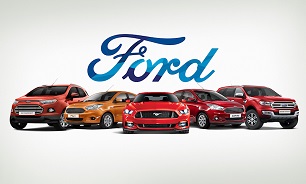Ford Partners With Mahindra To Establish Foothold In India
The move comes as GM announces its withdraw from the extremely competitive market.

Khodrocar - India is a hotbed for auto manufacturers and Ford wants to be a part of it. The Dearborn-based automaker released a joint statement today with India-based Mahindra, outlining a joint partnership to explore a variety of sectors in the automotive realm that, among other things, could help Ford gain a foothold in India’s rapidly expanding auto market. The current collaboration is set to run for three years, at which point both companies will reevaluate the situation and make new plans accordingly.
"Ford is committed to India and this alliance can help us deliver the best vehicles and services to customers while profitably growing in the world’s fifth largest vehicle market," said Jim Farley, Ford executive vice president and president of Global Markets.
India already supports a $30 billion auto market according to Automotive News, and that market is expanding rapidly. By 2020, India is projected to rank third in the world for sales behind China and the U.S., with small cars leading the way. As it stands now, Hyundai and Suzuki hold a significant portion of the market despite efforts by major brands such as Volkswagen and General Motors to gain share. In fact, while Ford seeks to gain new ground in India, GM has decided to withdraw from region.
This new partnership is neither Ford’s first entry into Indian markets, nor its first alliance with Mahindra. The two companies worked together starting in 1995, manufacturing a variety of models from a factory in Chennai. Facing stiff competition in the region even then, Ford pulled out in 2005 but the stakes – and potential for profit – have certainly risen since then.
"Ford is committed to India and this alliance can help us deliver the best vehicles and services to customers while profitably growing in the world’s fifth largest vehicle market," said Jim Farley, Ford executive vice president and president of Global Markets.
India already supports a $30 billion auto market according to Automotive News, and that market is expanding rapidly. By 2020, India is projected to rank third in the world for sales behind China and the U.S., with small cars leading the way. As it stands now, Hyundai and Suzuki hold a significant portion of the market despite efforts by major brands such as Volkswagen and General Motors to gain share. In fact, while Ford seeks to gain new ground in India, GM has decided to withdraw from region.
This new partnership is neither Ford’s first entry into Indian markets, nor its first alliance with Mahindra. The two companies worked together starting in 1995, manufacturing a variety of models from a factory in Chennai. Facing stiff competition in the region even then, Ford pulled out in 2005 but the stakes – and potential for profit – have certainly risen since then.
"Our two companies have a long history of cooperation and mutual respect,” said Farley. "The memorandum of understanding we have signed today with Mahindra will allow us to work together to take advantage of the changes coming in the auto industry. The enormous growth potential in the utility market and the growing importance of mobility and affordable battery electric vehicles are all aligned with our strategic priorities.”
Source: motor1.com
Latest News


